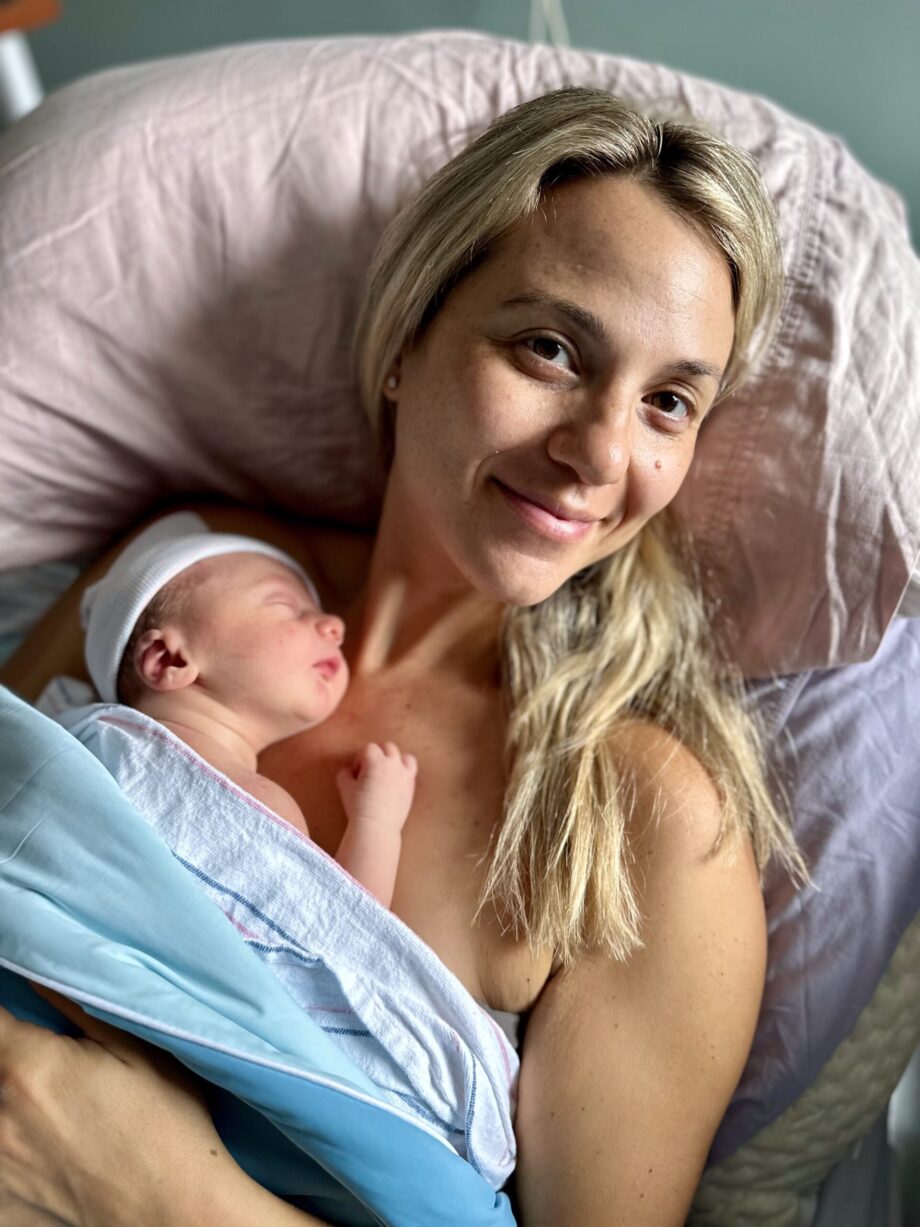Throughout your pregnancy, you have countless appointments to ensure you and the baby are growing strong. You get counseling on what you can and cannot eat while pregnant and you crave the day when you can once again enjoy sushi and sub sandwiches again. But, throughout the pregnancy, and even the postpartum period in the hospital, you are missing out on a huge piece of information that can affect how fast you recover from pregnancy and delivery.
Delivery is trauma on the body and for many women, especially those who have C-sections (which is considered major surgery), it takes time for the body to recover and heal. Those first few days postpartum are a rollercoaster of learning and emotions, a time to be savored with your new little one. One thing they do not tell you before leaving the hospital or at your 6-week follow-up appointment is what nutrients you need to help you recover better, and faster to help you feel like yourself again.
Consuming the right nutrients is one of the most basic and fundamental ways you can support your recovery and provide nourishment to your body and your newborn. Not only do these nutrients promote healing, but they can help boost energy levels, balance your all-over-the-place hormones, enhance immune function and support breastfeeding if you happen to be nursing.
Here is your guide to nutrients and nutrition recommendations you will want to consider in your postpartum period to help you recover better and faster, as well as provide for your baby if you choose to breastfeed. In this guide, we will cover:
- What are the important nutrients should I be getting during the postpartum period?
- How many extra calories should I be eating a day if I am breastfeeding?
- How can I get the nutrients I need for postpartum?
- What can I do before delivery to prepare for recovery through nutrition?
What important nutrients do I need postpartum?
Postpartum nutrition is just as important as getting the right nutrition while pregnant. A 2020 study published in the journal nutrients concluded that most women are missing the mark on intakes of vital nutrients like fiber and vitamins C and E during the postpartum period which increases risk for other health and healing issues.
Your body is in a state of inflammation, working hard to heal from incisions and tears, as well as replace blood volume that is lost. Fiber as well as vitamins C and E are just some of the important nutrients in the postpartum period that can be achieved through proper nutrition and supplementation.
While a good, varied diet is important for recovery, there are other key nutrients we can think about during the postpartum period, here is a look at some of the most important nutrients to incorporate in your postpartum diet.
Here are some important nutrients to include in your postpartum diet:
Protein
Iron and protein are important to aid in the recovery of blood volume and tissue repair following birth. Both are needed for a strong immune system as well, explains Registered Dietitian Lisa Andrews ME.d., R.D., L.D. of Sound Bites Nutrition. Both protein and iron can be found in fish, meat, seafood, poultry, dairy, soy and beans.
Calcium
“Calcium is important to support breastfeeding but also to help manage blood pressure and support bone health,” says Andrews. During pregnancy, if the mom is not getting enough calcium through diet and supplementation, the baby will pull from the mom’s calcium stores from bone to build and develop their bones. Without meeting these needs during pregnancy, the lack of sufficient calcium stores can affect milk supply in breastfeeding moms as well as blood pressure and healing. Include calcium-rich foods such as dairy products (milk, yogurt, cheese), fortified plant-based milk alternatives, tofu, leafy greens, and almonds in your diet.
Folate
You probably remember this all-important nutrient from your pregnancy days—it plays a crucial role in DNA synthesis and cell division, and supports overall maternal health during the postpartum period. You can find folate in leafy greens, citrus fruits, fortified cereals, beans, lentils, and avocados in your diet.
Omega-3 fatty acids
Omega-3 fatty acids are important for brain health and development, and they may also help reduce inflammation and support mood during the postpartum period. Include omega-3-rich foods such as fatty fish (salmon, sardines, trout), walnuts, flaxseeds, chia seeds, and hemp seeds in your diet. “If a mom is breastfeeding then she will also need to focus on DHA, a type of Omega-3 fatty acid that is essential for heart and brain health,” explains Celine Thompson, M.S., R.D.N. of Fueling Fertility. “DHA is found in fatty fish, seeds, and nuts like chia and flax as well as oils like flax and canola oils.”
Vitamin D
Vitamin D is another nutrient that should be supplemented to help with meeting needs post-birth. A 2018 meta-analysis published in the Journal of Medicine and Life found a significant association between vitamin D levels in the body and risk for postpartum depression. “Unfortunately, vitamin D is hard to come by in foods, so a supplement is likely necessary but also include fatty fish, fortified eggs, dairy, juice, and mushrooms in your diet for an extra boost,” says Registered Dietitian and Certified Lactation Consultant, Alexis Cascone, M.S., R.D., C.L.C..
B vitamins
Lastly, whole grains provide a variety of vitamins and minerals like B vitamins which are important for healing and fiber, too. B vitamins like B1, B6 and B12 play important roles in supporting the nervous system and neurotransmitter synthesis. They can help regulate mood, improve cognitive function and alleviate hormonal fluctuations that are hallmarks of the postpartum period.
Fiber
Not only can it help regulate your bowel movements, but fiber can also help take the edge of constipation, which is unfortunately quite common during the postpartum period. Constipation can then lead to straining, which can lead to the development of painful hemorrhoids, or swollen and inflamed veins in the rectum. Fiber also helps regulate blood sugar. Include fiber-rich foods such as fruits, vegetables, whole grains, beans, lentils, nuts, and seeds in your diet.
What nutrients do I need to focus on while breastfeeding?
If you are breastfeeding your baby, there are additional postpartum and breastfeeding nutrition needs that we need to consider to ensure you are healthy and healing as well as supplying nutrient-dense breast milk to your baby. The most important and foundational piece while breastfeeding to focus on is getting enough calories in to support milk production. “While breastfeeding, mom needs about 500 calories more a day to maintain her supply,” says Cascone. That additional 500 calories comes on top of the maintenance needs for overall intake.
After you ensure you are getting enough food in, we can turn to look at what nutrients are essential for making nutrient-dense breast milk for your baby. “If a mom is breastfeeding then she will also need to focus on choline, vitamin D, and DHA to support the baby’s brain development, as well as electrolytes for proper hydration,” says Thompson.
Staying hydrated can seem like a challenge during the postpartum period. Without meeting our hydration needs, we can see a dip in milk production as well as have issues with healing. While everyone’s hydration needs are different, one great way to ensure you’re hydrated is by monitoring the color of your urine. Your urine should be pale yellow to indicate proper hydration. Darker yellow and amber-colored urine can indicate dehydration.
How can I get the nutrients I need for postpartum recovery and breastfeeding?
A diet focused on whole foods and well-balanced meals is important for recovery, but those first few weeks can feel like a whirlwind where you are trying to build a routine. “While moms want to take care of themselves, this is just the start of putting others before yourself, starting with a new baby,” says Andrews. “If you are not nourished yourself, you will not have the energy and stamina that it takes to take care of a family.”
Eating regularly, at least every 2-3 hours, with something small can be a great way to start getting the nutrition you need. Andrews recommends a food-first approach with clients, but these nutrients can also be obtained through a prenatal vitamin or women’s multivitamin.
This means we can start to focus on meals that have protein sources like fish, meat, seafood, poultry, dairy, soy and beans to get in nutrients like protein, for healing as well as iron to help with treating iron deficiency that can happen from blood loss with birth. Incorporating leafy greens and vegetables for their vitamins and minerals plus fiber for better digestion throughout the day. Lastly, whole grains provide a variety of vitamins and minerals like B vitamins which are important for healing and fiber, too. “This may seem overwhelming at first, but focusing on whole nutrient-dense foods will help moms ensure intake of these important nutrients,” notes Cascone.
While it may seem impossible to get everything you need while taking care of and bonding with your baby, a great way to ensure you are at least covering your nutrient needs is continuing to take your prenatal vitamin or a one-a-day women’s multivitamin. Thompson recommends that non-lactating moms continue to take a prenatal vitamin for 6 months postpartum and that breastfeeding moms continue taking a prenatal vitamin for the duration of breastfeeding as recommended by the World Health Organization.
What can I do before delivery to prepare for recovery through nutrition?
Preparation for the baby and healing can start long before delivery day. Not only can you start looking into getting help to get back to your physical best, like through pelvic floor therapy. You can start to plan quick and easy meals to make healthy choices during the first few weeks postpartum. “If you have the time (and energy), prepare some healthy meals that you can freeze and easily heat up quickly. Ideally, if you can time it right, try to stock up on healthy foods like fruits, pre-chopped veggies, and healthy snacks so you have convenient foods for when you come home,” says Jamie Johnson, RDN from Ingraining Nutrition.
Make a day out of nesting with friends where you get together and make freezer-safe meals that can be cooked and had any time. Crockpot meals and casseroles tend to be kept safely in the freezer for about 6 months before eating.
Consider hiring a postpartum doula who can help with emotional support for you and your partner, education, and information on feeding and taking care of your baby, and you, too. Doulas also can help with household tasks like laundry and meal prep to help you take the pressure off having to juggle household activities along with bonding with the baby.
The postpartum period can feel overwhelming and makes every day feel very different. The number one priority during this period is feeding your baby and making sure you are taking care of yourself for proper recovery. Having well rounded and balanced meals can be a great way to fulfill your nutrient needs for recovery while being able to provide for your baby.
Read more on postpartum care and resources on The Mother Chapter.
Author
-

Emily Tills is a registered dietitian based in Syracuse, New York, who's passionate about helping men and women ditch dieting for good and build healthy habits that last a lifetime. You can learn more about her at Nourished With Emily.
View all posts




